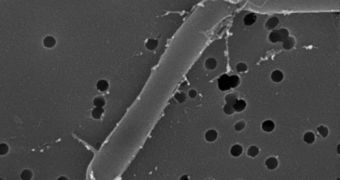A scientist known for his innovations in biofuel technologies managed recently to achieve another important breakthrough in the field. His accomplishment could lead to the wide adoption of butanol over ethanol, as a primary biofuel.
The researcher managed to create a new method of producing the fuel, which no longer requires the use of edible feedstock such as beets, corn starch, and sugarcane. The new approach can convert agricultural wastes and algae directly into butanol.
Some of the many advantages that this substance has over its direct competitor is that it pack more energy than ethanol, while at the same time being able to endure transportation via oil pipelines.
Thus far, production was limited on account of the obstacles posed by finding enough raw materials to be converted into the biofuel. But that issue may have been fixed by biomolecular engineer James Liao.
The scientist, based at the University of California in Los Angeles (UCLA), was recently able to modify the genome of a microorganism called Clostridium cellulolyticum, so that it would produce the chemical directly from wastes and algae.
This direct cellulose-to-butanol conversion process is entirely unique, and it may also be just what the industry needed. At the same time, applying it reduces the carbon footprint of operating a biofuel conversion facility, Technology Review reports.
This comes at a very good time, considering that critics have long since voiced concerns at the fact that it takes a vast amount of corn to produce only a liter of butanol. It “has some technical benefits, but the real problem is the amount of food that goes into making a gallon of fuel,” Jeremy Martin explains.
He is a senior scientist at the Cambridge, Massachusetts-based advocacy group Union of Concerned Scientists. The organization has been lobbying Congress to end tax credits for corn ethanol.
Using Liao's new microbe, the association with corn and other similar products could finally disappear, experts say. All the UCLA expert had to do was insert a pathway for converting sugar into isobutanol inside the microbe.
Isobutanol is a high-octane isomer of butanol, and the microbial pathway in charge of producing it was created by Liao some three years ago.
“These results show the feasibility of using proteins for biorefineries. They're certainly much more sustainable than petroleum or coal or sugar,” the expert and his colleagues say.
Details of the work appear in this month's issue of the top scientific journal Nature Biotechnology.

 14 DAY TRIAL //
14 DAY TRIAL //